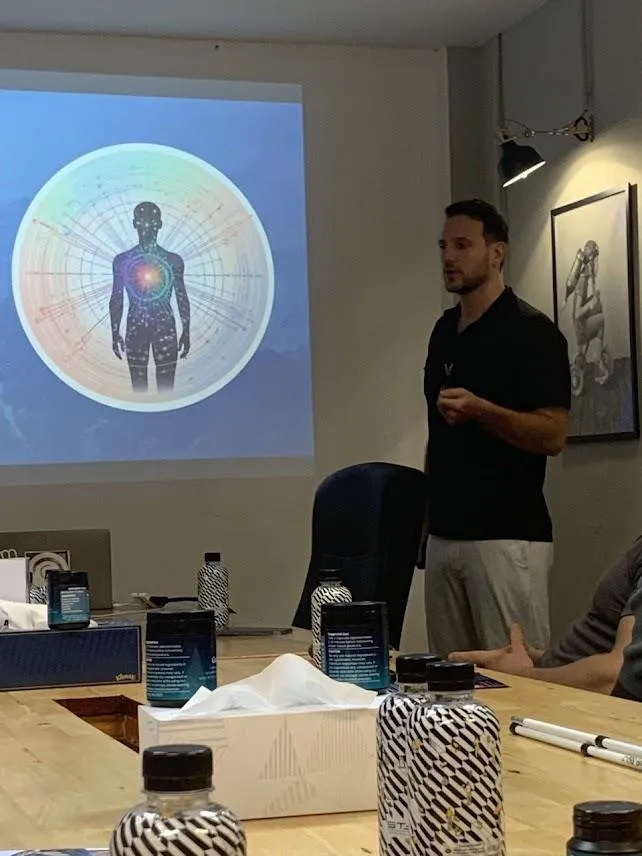Do you have a calling?
Are you looking for yourself?
Henosis is founded upon the idea that every human being in unique and has a purpose. You have aspects that make you so different to every other human on the planet, yet such deep similarities that show we're all the same.
Origin Story of Henosis
The Greek word henosis refers to the process of achieving a state of oneness or unity with the divine. This concept has been central to many mystical and philosophical traditions throughout history, particularly in ancient Greece.
The term henosis comes from the Greek word ἕνωσις, which means "union" or "merging." It was used by several ancient Greek philosophers, including Plotinus and Proclus, to describe the goal of mystical practice.
For these philosophers, the goal of mystical practice was to transcend the limitations of the physical world and achieve a direct experience of the divine.
This experience was seen as a merging or union with the divine, a state of consciousness in which the individual and the divine were no longer separate entities but were united as one.
In some mystical traditions, henosis was seen as a gradual process of spiritual development, in which the individual gradually purifies their mind and body and becomes more attuned to the divine. In others, it was seen as a sudden, spontaneous experience that could occur at any time.
The concept of henosis was also central to many ancient Greek religious practices, particularly in the mystery religions. These were secretive, initiatory cultures that focused on the direct experience of the divine through ritual practices, often involving ecstatic states of consciousness.
Henosis has also been an important concept in the history of Christianity, particularly in the Eastern Orthodox tradition. In this tradition, henosis is seen as the ultimate goal of spiritual practice, a state of union with God that is achieved through prayer, contemplation, and asceticism.

Overall, the concept of henosis is a complex and multifaceted one that has played a central role in many mystical and philosophical traditions throughout history. Whether seen as a gradual process of spiritual development or a sudden, spontaneous experience, it represents the human longing for a direct experience of the divine, and the recognition that this experience lies at the heart of our deepest aspirations and desires.

HENOSIS PURPOSE
Henosis was formed to hold space for the lost soul, questioning their current reality, and to provide alternative information and experiences that may serve as the launching pad for their new life.

HENOSIS VISION
We believe that all humans deserve to live a life of fulfillment and to participate in the raising of the vibrational frequency of earth to expand consciousness.

HENOSIS MISSION
Henosis assists with the shedding of our limiting beliefs, overcoming our emotional and energetic blocks and reprogramming harmful habits and biases. We develop educational information, events and activities to promote ancient wisdom, alternative medicines, new age science and holistic healing modalities to empower the individual to discover their own limitless possibilities and increase awareness.
What the greats say about Henosis over Millenia
Within the word henosis lies a powerful invitation to experience the unity and oneness that exists within and around us, to dissolve the illusion of separateness and awaken to the truth of our interconnectedness with all of life.
Plato
Henosis is the transcendence of the self, the merging of the individual with the divine, and the attainment of spiritual enlightenment.
Eckhart Tolle
The experience of henosis is a mystical journey, a quest for the ultimate truth and the ultimate reality.
Carl Jung
In the state of henosis, the individual ego dissolves into the infinite, and the soul merges with the divine.
Deepak Chopra
Henosis is the realisation that we are all interconnected, that we are all part of a greater whole, and that we are all one.
Alan Watts
In the state of henosis, the boundaries between self and other dissolve, and the individual becomes one with the universe and all that exists.
Sri Ramana Maharshi
Henosis is the state of being in which one transcends the limitations of the ego and realises the true nature of the self as part of the divine.
Buddha
Henosis is the ultimate liberation, the release from the bonds of the ego and the attainment of eternal bliss and peace.
Henosis
Henosis represents the journey of transcending individuality, merging with the divine, and awakening to the unity that connects all of existence.
Interested in changing your life?
Check out some of our free articles
HEALTH & WELLBEING

Deconstructing the Science Behind Dopamine Detox: Biohacking Your Brain for Better Productivity
The world we live in today is dominated by technology, and the constant bombardment of stimuli can wreak havoc on our brains. From smartphones that keep us glued to social media, to gaming consoles that consume our hours, we are surrounded by an unnatural amount of stimulus. This overstimulation of the brain increases the production of dopamine, a neurotransmitter that is associated with the reward and motivation centers in the brain. However, too much dopamine can lead to addiction and decreased productivity. Therefore, it is crucial to keep the production of dopamine in balance, and one way to achieve this is through dopamine detox.
Dopamine: The Desire Hormone
Dopamine is a neurotransmitter that plays a vital role in the brain's reward and motivation system. It is often referred to as the "desire hormone" because it is responsible for our motivation to do things to reach our goals. However, too much dopamine can lead to addiction to substances or activities, while too little can result in laziness and lack of motivation. When we binge on pleasurable things, our brain compensates by bringing our dopamine levels lower and lower, and we become dependent on these stimuli to keep functioning. We spiral into a joy-seeking abyss. Therefore, it is crucial to keep dopamine levels stable.

Dopamine Detox: A Step Towards Productivity
Dopamine detox is a process of reducing the amount of dopamine produced by the brain by eliminating external stimuli that trigger it. This involves keeping away from smartphones, social media, games, TV, and other sources of high dopamine triggers. By depriving the brain of its easy-to-get high-level dopamine fix, we can start to appreciate hard-to-do but beneficial things like reading, playing an instrument, working, or studying as fun and worth the effort. Dopamine detox can help individuals regain control over their lives and be better able to address compulsive behaviors that may be interfering with their happiness.
Increasing Self-Control and Discipline Dopamine detox can help increase self-control and discipline, which are essential for a productive and successful lifestyle. It is not easy to remove high dopamine triggers from our lives, especially when we are already addicted to them. However, with discipline and a plan, we can fight these compulsive behaviors and curb our addictions. By planning and reserving parts of our day for beneficial activities like journaling, working out, meditating, focusing on our work and goals, doing chores, catching up with friends, reading a book, or starting a new hobby, we can gradually overcome our addiction to high dopamine triggers.
The Science Behind Dopamine Detox Dopamine detox is not just a theoretical concept; it is backed by scientific research. Studies have shown that addiction to high dopamine triggers like social media and gaming can have detrimental effects on the brain. A study conducted by Kuss et al. (2018) found that excessive social media use is associated with an increased risk of anxiety, depression, and sleep problems. Another study by Yao et al. (2017) found that excessive gaming is associated with alterations in brain structure and function, which can lead to cognitive and emotional impairments.
On the other hand, dopamine detox has been shown to have positive effects on the brain. A study conducted by Bae et al. (2021) found that dopamine detox improves cognitive function, memory, and attention span. Another study by Littman et al. (2018) found that dopamine detox can help reduce stress and anxiety levels, leading to better overall mental health.
Philosophy Behind Dopamine Detox
The philosophy behind dopamine detox is to reset our brain's reward system by eliminating or reducing the constant stimulation of dopamine release from artificial sources such as social media, video games, junk food, and other addictive substances or behaviors. By doing so, we can regain control over our habits and focus on more meaningful and fulfilling activities. However, it is important to note that dopamine detox is not a scientifically proven method and should not be considered a substitute for professional medical or psychological advice.
Conclusion
In conclusion, dopamine detox is a trending concept that suggests taking a break from over-stimulating activities to improve focus and productivity. It is essential to listen to your body's needs and seek professional help if you are struggling with addiction or mental health issues. Dopamine detox can be a helpful tool to break unhealthy habits and increase self-awareness, but it should be used in moderation and with caution.
PSYCHOLOGY

Deconstructing the Science Behind Dopamine Detox: Biohacking Your Brain for Better Productivity
The world we live in today is dominated by technology, and the constant bombardment of stimuli can wreak havoc on our brains. From smartphones that keep us glued to social media, to gaming consoles that consume our hours, we are surrounded by an unnatural amount of stimulus. This overstimulation of the brain increases the production of dopamine, a neurotransmitter that is associated with the reward and motivation centers in the brain. However, too much dopamine can lead to addiction and decreased productivity. Therefore, it is crucial to keep the production of dopamine in balance, and one way to achieve this is through dopamine detox.
Dopamine: The Desire Hormone
Dopamine is a neurotransmitter that plays a vital role in the brain's reward and motivation system. It is often referred to as the "desire hormone" because it is responsible for our motivation to do things to reach our goals. However, too much dopamine can lead to addiction to substances or activities, while too little can result in laziness and lack of motivation. When we binge on pleasurable things, our brain compensates by bringing our dopamine levels lower and lower, and we become dependent on these stimuli to keep functioning. We spiral into a joy-seeking abyss. Therefore, it is crucial to keep dopamine levels stable.

Dopamine Detox: A Step Towards Productivity
Dopamine detox is a process of reducing the amount of dopamine produced by the brain by eliminating external stimuli that trigger it. This involves keeping away from smartphones, social media, games, TV, and other sources of high dopamine triggers. By depriving the brain of its easy-to-get high-level dopamine fix, we can start to appreciate hard-to-do but beneficial things like reading, playing an instrument, working, or studying as fun and worth the effort. Dopamine detox can help individuals regain control over their lives and be better able to address compulsive behaviors that may be interfering with their happiness.
Increasing Self-Control and Discipline Dopamine detox can help increase self-control and discipline, which are essential for a productive and successful lifestyle. It is not easy to remove high dopamine triggers from our lives, especially when we are already addicted to them. However, with discipline and a plan, we can fight these compulsive behaviors and curb our addictions. By planning and reserving parts of our day for beneficial activities like journaling, working out, meditating, focusing on our work and goals, doing chores, catching up with friends, reading a book, or starting a new hobby, we can gradually overcome our addiction to high dopamine triggers.
The Science Behind Dopamine Detox Dopamine detox is not just a theoretical concept; it is backed by scientific research. Studies have shown that addiction to high dopamine triggers like social media and gaming can have detrimental effects on the brain. A study conducted by Kuss et al. (2018) found that excessive social media use is associated with an increased risk of anxiety, depression, and sleep problems. Another study by Yao et al. (2017) found that excessive gaming is associated with alterations in brain structure and function, which can lead to cognitive and emotional impairments.
On the other hand, dopamine detox has been shown to have positive effects on the brain. A study conducted by Bae et al. (2021) found that dopamine detox improves cognitive function, memory, and attention span. Another study by Littman et al. (2018) found that dopamine detox can help reduce stress and anxiety levels, leading to better overall mental health.
Philosophy Behind Dopamine Detox
The philosophy behind dopamine detox is to reset our brain's reward system by eliminating or reducing the constant stimulation of dopamine release from artificial sources such as social media, video games, junk food, and other addictive substances or behaviors. By doing so, we can regain control over our habits and focus on more meaningful and fulfilling activities. However, it is important to note that dopamine detox is not a scientifically proven method and should not be considered a substitute for professional medical or psychological advice.
Conclusion
In conclusion, dopamine detox is a trending concept that suggests taking a break from over-stimulating activities to improve focus and productivity. It is essential to listen to your body's needs and seek professional help if you are struggling with addiction or mental health issues. Dopamine detox can be a helpful tool to break unhealthy habits and increase self-awareness, but it should be used in moderation and with caution.
HAPPINESS

Deconstructing the Science Behind Dopamine Detox: Biohacking Your Brain for Better Productivity
The world we live in today is dominated by technology, and the constant bombardment of stimuli can wreak havoc on our brains. From smartphones that keep us glued to social media, to gaming consoles that consume our hours, we are surrounded by an unnatural amount of stimulus. This overstimulation of the brain increases the production of dopamine, a neurotransmitter that is associated with the reward and motivation centers in the brain. However, too much dopamine can lead to addiction and decreased productivity. Therefore, it is crucial to keep the production of dopamine in balance, and one way to achieve this is through dopamine detox.
Dopamine: The Desire Hormone
Dopamine is a neurotransmitter that plays a vital role in the brain's reward and motivation system. It is often referred to as the "desire hormone" because it is responsible for our motivation to do things to reach our goals. However, too much dopamine can lead to addiction to substances or activities, while too little can result in laziness and lack of motivation. When we binge on pleasurable things, our brain compensates by bringing our dopamine levels lower and lower, and we become dependent on these stimuli to keep functioning. We spiral into a joy-seeking abyss. Therefore, it is crucial to keep dopamine levels stable.

Dopamine Detox: A Step Towards Productivity
Dopamine detox is a process of reducing the amount of dopamine produced by the brain by eliminating external stimuli that trigger it. This involves keeping away from smartphones, social media, games, TV, and other sources of high dopamine triggers. By depriving the brain of its easy-to-get high-level dopamine fix, we can start to appreciate hard-to-do but beneficial things like reading, playing an instrument, working, or studying as fun and worth the effort. Dopamine detox can help individuals regain control over their lives and be better able to address compulsive behaviors that may be interfering with their happiness.
Increasing Self-Control and Discipline Dopamine detox can help increase self-control and discipline, which are essential for a productive and successful lifestyle. It is not easy to remove high dopamine triggers from our lives, especially when we are already addicted to them. However, with discipline and a plan, we can fight these compulsive behaviors and curb our addictions. By planning and reserving parts of our day for beneficial activities like journaling, working out, meditating, focusing on our work and goals, doing chores, catching up with friends, reading a book, or starting a new hobby, we can gradually overcome our addiction to high dopamine triggers.
The Science Behind Dopamine Detox Dopamine detox is not just a theoretical concept; it is backed by scientific research. Studies have shown that addiction to high dopamine triggers like social media and gaming can have detrimental effects on the brain. A study conducted by Kuss et al. (2018) found that excessive social media use is associated with an increased risk of anxiety, depression, and sleep problems. Another study by Yao et al. (2017) found that excessive gaming is associated with alterations in brain structure and function, which can lead to cognitive and emotional impairments.
On the other hand, dopamine detox has been shown to have positive effects on the brain. A study conducted by Bae et al. (2021) found that dopamine detox improves cognitive function, memory, and attention span. Another study by Littman et al. (2018) found that dopamine detox can help reduce stress and anxiety levels, leading to better overall mental health.
Philosophy Behind Dopamine Detox
The philosophy behind dopamine detox is to reset our brain's reward system by eliminating or reducing the constant stimulation of dopamine release from artificial sources such as social media, video games, junk food, and other addictive substances or behaviors. By doing so, we can regain control over our habits and focus on more meaningful and fulfilling activities. However, it is important to note that dopamine detox is not a scientifically proven method and should not be considered a substitute for professional medical or psychological advice.
Conclusion
In conclusion, dopamine detox is a trending concept that suggests taking a break from over-stimulating activities to improve focus and productivity. It is essential to listen to your body's needs and seek professional help if you are struggling with addiction or mental health issues. Dopamine detox can be a helpful tool to break unhealthy habits and increase self-awareness, but it should be used in moderation and with caution.

